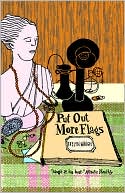“Basil needs this war. He’s not suited to peace.”
Basil Seal, familia r to readers of Black Mischief (1932) as the man hired to become the ruler of an African nation and to modernize it, has returned to England, his ludicrous efforts at modernization for naught. It is the autumn of 1939 (in this 1942 novel), just as war is breaking out, and Basil, one of the “bright, young things” on whom Waugh casts his satiric eye and biting wit, is bored. Penniless, he accepts his sister Barbara’s suggestion to help her to place urban children with rural families to protect them from the incipient bombings. Soon he has turned this in to a profitable business – country house residents are more than willing to pay Basil NOT to bring three especially monstrous children, to live with them.
r to readers of Black Mischief (1932) as the man hired to become the ruler of an African nation and to modernize it, has returned to England, his ludicrous efforts at modernization for naught. It is the autumn of 1939 (in this 1942 novel), just as war is breaking out, and Basil, one of the “bright, young things” on whom Waugh casts his satiric eye and biting wit, is bored. Penniless, he accepts his sister Barbara’s suggestion to help her to place urban children with rural families to protect them from the incipient bombings. Soon he has turned this in to a profitable business – country house residents are more than willing to pay Basil NOT to bring three especially monstrous children, to live with them.
Strong on character, grim humor, and satire, and short on overall plot, Waugh has created in this novel characters who represent the worst of upperclass young people – their shallow interests, indifferent education, frivolous behavior, lack of long-term goals, and seeming absence of any values except pleasure. Basil has had a long affair with Angela Lyne, but dallies with other women. Angela’s cuckolded husband Cedric enlists in the war effort, while she, lonely, turns to drink. Ambrose Silk, half-Jewish and openly gay, works to establish a literary magazine until he runs afoul of the censors (in the person of Basil). Two writers, Parsnip and Pimpernel, reputed to have been modeled on W. H. Auden and Christopher Isherwood, run off to the States to avoid the war completely.
 As the novel moves from autumn, 1939, to the summer of 1940, when the mobilization is fully underway, Waugh skewers the naivete of his subjects and their universal desire to use the war to get ahead. None of them take the war seriously, nor do they realize that the very fabric of their country is at stake. Basil and friends want to be among “the hard-faced men [of 1919] who did well out of the war.” Image is more important than reality, which they seem determined to ignore.
As the novel moves from autumn, 1939, to the summer of 1940, when the mobilization is fully underway, Waugh skewers the naivete of his subjects and their universal desire to use the war to get ahead. None of them take the war seriously, nor do they realize that the very fabric of their country is at stake. Basil and friends want to be among “the hard-faced men [of 1919] who did well out of the war.” Image is more important than reality, which they seem determined to ignore.
The last of Waugh’s satiric novels (since his later novels become far more serious), this one is full of ironic humor directed at the (usually) wealthy young people who allow life to happen to them, assuming that they will always be able to make lemonade from lemons. In the course of the novel, all will come to new understandings, and when France falls, the scene is set for reversals and revelations. Fun to read and historically important for the attitudes it records among this group, Put Out More Flags is classic Waugh satire.
Notes: The author’s photo as a young man appears on Ox Barrio: http://iki7.wordpress.com/
Also reviewed here: VILE BODIES, BRIDESHEAD REVISITED
